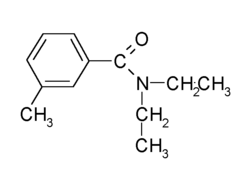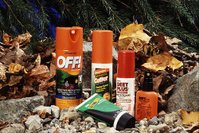Banning the Biters With Natural Insect Repellents
The common mosquito is, at first glance, a pathetic creature. Weighing, on average (and on an empty stomach), less than two milligrams, it's laughably small. It's so fragile even the slightest breeze can send it spiraling into oblivion. A human, when irritated, may crush it effortlessly between his or her fingertips. Upon closer inspection, however, this winged insect is anything but a pushover. The females of some species will fly miles for a blood meal. Others carry deadly diseases like malaria, encephalitis and yellow fever. Swarms of the biters have driven caribou off cliffs, backpackers to the brink of insanity.
It should come as no surprise, then, that outdoors-loving Americans, refusing to duck inside to escape a pest no bigger than a pencil eraser, will do almost anything to keep the pesky bugs at bay. In fact, in their effort to discourage the world's mosquitoes, blackflies, sand flies and ticks, consumers spend an estimated $200 million annually on sprays, liquids, lotions, candles and other anti-insect concoctions. The overwhelming majority of that money goes toward products containing the insecticide N, N-diethyl-meta-toluamide, or DEET. Nearly 230 DEET-containing products made by dozens of companies are currently registered with the Environmental Protection Agency (EPA), and an estimated 38 percent of the U.S. population uses DEET-based repellents every year. But while DEET is considered by many experts to be the most effective repellent ingredient on the market, the chemical has also been linked with a myriad of ailments, everything from minor skin rashes and muscle spasms to seizures and death.
How Safe Is Safe?
The EPA has concluded that products containing DEET are safe for consumers to use as long as label directions are followed. But for some, the government's reassurances are not sufficient. "We don't recommend people use DEET," says Pollyanna Lind, a spokesperson for the Northwest Coalition for Alternatives to Pesticides in Eugene, Oregon. "The health risks are just too great. There are alternative products and other things that people can do to control insects instead." Indeed, DEET-free bug repellents can now be found on the shelves of pharmacies, supermarkets and outdoors stores throughout the country. Offerings range from classic bestsellers like Avon Skin-So-Soft (now marketed, for $9, under the Bug Guard name) to little-known home remedies that rely almost entirely on garlic. Most natural repellents, however, use a blend of herbal oils to get the job done.
"Citronella, lemongrass, peppermint, eucalyptus and cedarwood," lists Bruce Schennum, director of research and education at Quantum, the maker of the aptly named Buzz Away. "No one knows for sure why they work," says Schennum, "but they do." Quantum's insect-repellent products, which include a spray ($5.99), towelettes ($7.99 for 12) and a sunblock lotion ($8.99), are widely regarded as some of the best natural varieties available. To test their products' potency, Quantum stocked a collection of cages with bloodthirsty mosquitoes and had volunteers thrust their repellent-soaked arms into the swarms for five minutes at a time. "If they were bitten twice in that five-minute period it was considered repellent failure," explains Schennum. "Buzz Away, on average, protected people for about two hours."
Other herbal concoctions include Aubrey Organics' GONE! Spray ($5.75), Burt's Bees' Farmer's Friend Lemongrass Insect Lotion ($5) and lemongrass- and citronella-scented incense sticks ($8 for 10), Dean Coleman Herbal Luxuries' Bug Block ($7.95), and Soul Essentials' Anti-Bug lotion ($10). The Anti-Bug blend, which consists of geranium, lavender, citronella, peppermint and lemongrass, was, according to Soul Essentials' owner Rebecca Neely, difficult to perfect. "It was just trial and error, trial and error," says Neely. "Finally we found the combination that not only worked, but also smelled really nice."
Do They Work?
Some quip that these concoctions aren't as effective as their chemical counterparts, but according to University of New Mexico Integrated Pest Management Coordinator Richard Fagerlund, such complaints are generally unwarranted. "Natural products work as wall as products that contain DEET," says Fagerlund. "But they usually don't work as long. You just have to use them more often."
If the thought of repeatedly applying repellents (even if they are "natural") to your body sounds unappealing, there are alternative means of battling the biters, though they may not be as effective. Ukiah, California-based Real Goods offers a solar mosquito guard ($8.95) that emits a high-frequency audio wave to drive away mosquitoes within a 12-foot radius. The guard, which attaches to a key chain, recharges in three hours of sunlight and can be activated with a mere flick of a switch when the mosquitoes fly in to feed. If money isn't an issue, the company sells a monolithic mosquito lamp ($259) guaranteed to keep biters on the run. Made of recycled copper and glass, the lamp is shaped like a giant mosquito. Fill the bionic bug's head with citronella lamp oil, light the wick, and watch all attackers turn and flee for their lives. Finally, to get the bugs before they get you, try the doughnut-shaped Mosquito Dunks ($11.95 for six), designed to kill mosquitoes before they hatch. The dunks, which float on water (birdbaths, rain barrels, ditches, ponds, unused pools, etc.), release a natural pesticide called bacillus thuringiensis that is lethal to mosquito larvae. A single dunk destroys larvae in up to 100 square feet of water for a month.
Another retailer, Bozeman, Montana's Planet Natural, offers three promising products on its web site (www.planetnatural.com). When the deerflies are thicker than the trees, save your swatters and slap a Detex fly patch ($2.95 for four) on the back of your hat. While the patch won't repel the pests, its sticky surface is guaranteed to pin them in mid-flight. If it's the mosquitoes that have you cowering, mount Cabin Fever's cedarwood bat house ($29.95) to a tree and put a fleet of hungry bats to work. One bat, Planet Natural claims, will consume up to 600 mosquitoes in an hour. Rounding out the anti-bug trio is what the company's owner, Eric Vinje, considers to be the sure thing: an herbal lotion called All Terrain ($7.50) that uses a patented timerelease formula to deliver maximum protection from biters for up to four hours. "Sometimes here in Montana things can get pretty vicious in the backcountry," says Vinje. "But this one seems to work."
Dress for Success
Of course, sometimes nothing works. When the bugs attack in dense droves, even sprays, zappers or the repugnant smell of bodies rubbed in garlic can all fail miserably. In those cases, says Tacoma, Washington-based entomologist Terry Whitworth, it's time to tweak your line of defense. The first thing you can do is dress like a warrior. "Wear a head net," says Whitworth. "It can save your sanity." For full-body protection you can take it one step further with bug-proof shirts, pants and ankle-guarding gaiters (all available from the Original Bug Shirt Company). Another option is to time your outdoor excursions to avoid insects when they're at their worst. For instance, if blackflies are the problem, avoid morning exposure when they're most likely to be feeding. To miss the mosquitoes, hunker down in the early evening. Finally, says Whitworth, consider the very reason biters are attracted to you in the first place: carbon dioxide. Each time you exhale it's like ringing a dinner bell. The solution, fortunately, is simple. "If you don't breathe" says Whitworth, "you won't have a problem." CONTACT: Aubrey Organics, (800) AUBREYH, www.aubreyorganics.com; Avon, (800) 500-AVON, www.avon.com; Burt's Bees, (800)849-7112, www.burtsbees.com; Dean Coleman Herbal Luxuries, (703) 524-5196; Original Bug Shirt, (800)998-9096, www.bugshirt.com; Planet Natural, (800)289-6656, www.planetnatural.com; Quantum's Buzz Away, (800)448-1448, www.quantumhealth.com; Real Goods, (800)762-7325, www.realgoods.com; Soul Essentials, (888)898-7685, www.care4yoursoul.com.
CHRIS HAYHURST is a freelance writer in Fort Collins, CO.
COPYRIGHT 2000 Earth Action Network, Inc.
COPYRIGHT 2003 Gale Group



